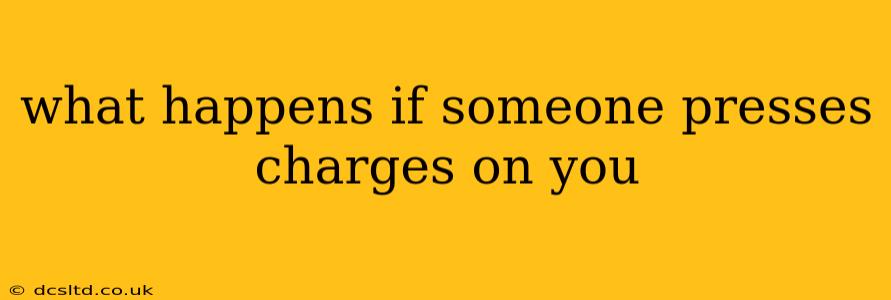What Happens If Someone Presses Charges Against You?
Being accused of a crime and having someone press charges is a serious matter with potentially significant consequences. The process can be complex and varies based on the severity of the alleged crime, your location, and other factors. This guide will outline the general steps involved, but it's crucial to remember that this is not legal advice, and you should always consult with a qualified attorney if you face such a situation.
What Does "Pressing Charges" Mean?
"Pressing charges" typically refers to a victim or other party formally reporting a crime to law enforcement and requesting prosecution. This doesn't automatically mean the person will be arrested or convicted. Law enforcement will investigate the allegations, gather evidence, and decide whether to pursue a case. The prosecutor's office will ultimately decide whether to file formal charges and proceed with a prosecution.
What Happens After Someone Presses Charges?
The process generally follows these steps:
-
Initial Report: The alleged victim files a police report, detailing the incident and providing any available evidence. This might include witness statements, photos, videos, or physical evidence.
-
Investigation: Law enforcement investigates the allegations, interviewing witnesses, gathering evidence, and potentially searching for additional information. This phase can take a significant amount of time, depending on the complexity of the case.
-
Arrest (Potentially): If the investigation yields enough evidence to suggest probable cause, law enforcement may arrest the accused. This doesn't necessarily mean guilt, only that there's enough evidence to proceed with the legal process.
-
Arraignment: If arrested, the accused is brought before a judge for an arraignment. At this hearing, the charges are formally read, the accused is informed of their rights (such as the right to remain silent and the right to an attorney), and bail is often set.
-
Pre-Trial Proceedings: This phase involves various legal steps, such as discovery (exchange of evidence between the prosecution and the defense), motions to suppress evidence, and plea bargaining negotiations.
-
Trial (Potentially): If a plea agreement isn't reached, the case will proceed to trial. A jury or judge will hear evidence and determine guilt or innocence.
-
Sentencing: If found guilty, the accused will be sentenced according to the law. The sentence could range from probation to imprisonment, depending on the severity of the crime and other factors.
What are the Different Types of Charges?
Charges can range from minor misdemeanors (like petty theft) to serious felonies (like assault or murder). The severity of the charge significantly impacts the potential consequences.
What if I am Falsely Accused?
If you believe you are falsely accused, it's crucial to remain calm and seek legal counsel immediately. Your attorney can help you navigate the legal process, build a strong defense, and protect your rights.
How Can I Protect Myself?
Prevention is key. Being aware of your actions and surroundings can help minimize the risk of being involved in a situation that could lead to criminal charges.
What Rights Do I Have If Someone Presses Charges Against Me?
You have the right to remain silent, the right to an attorney, and the right to a fair trial. These rights are crucial to protecting yourself throughout the legal process. Understanding these rights is paramount.
This information is for educational purposes only and should not be considered legal advice. It is essential to consult with a legal professional for personalized guidance if you are facing criminal charges.
